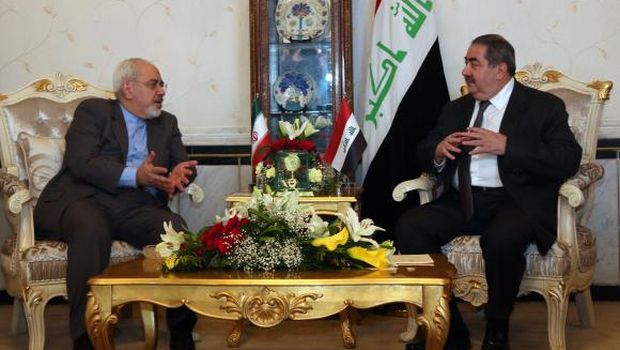
Iraqi Foreign Minister Hoshyar Zebari, right, meets with his Iranian counterpart Mohammad Javad Zarif on January 14, 2014, in Baghdad, Iraq. (AFP Photo/Pool/Khalid Mohammed)
Washington, Baghdad and London, Asharq Al-Awsat—US State Department officials have refused to comment on a reported arms deal between Iraq and Iran, at a time when the US is hoping to reach agreement with Iran on its nuclear program.
Reuters reported on Monday that Iran signed an agreement in November 2013 to sell arms and ammunition to Iraq worth around 195 million US dollars, in a step which could be seen as a violation of the UN embargo on Iranian arms sales.
Diplomats in the Iran sanctions committee at the UN, speaking anonymously, expressed concern about the deal but refused to make further comment.
Iran’s Ambassador to Iraq Hassan Danaifar has denied the reports, telling the Mehr news agency on Tuesday that no arms deal had been signed between Iraq and Iran.
The arms agreement reportedly includes eight deals in total: six with the Iranian state-run Defense Industries Organization and two with a state-owned Iranian electronics company.
It includes the sale of small arms, tank and artillery ammunition, as well as mortars and mortar guidance systems, night-vision equipment, and communications equipment. Reuters said the agreement did not specify a delivery schedule.
A US official, speaking on condition of anonymity, said: “This kind of deal complicates Washington’s attempts to negotiate with Iran and relax international sanctions imposed because of its nuclear program.”
The official added: “If the reports are true, they will raise serious fears, because transferring such weapons from Iran to a third country represents a direct violation of Iran’s commitments according to Security Council Resolution 1747.”
The revelation of the deal follows a visit by Iraqi Prime Minister Nuri Al-Maliki to the United States to pressure the Obama administration to supply Iraq with sophisticated weapons—including helicopter gunships and missiles—to fight extremists and groups linked to Al-Qaeda in Iraq.
Some US legislators have expressed reservations and objections to the transfer of advanced weapons to a country trying to build closer relations with Iran, as well as fears that the Iraqi government may use them for internal repression. Meanwhile, a number of Iraqi MPs have expressed anger at the delay in the delivery of US arms to Iraq.
Reuters quoted the Iraqi prime minister’s media adviser, Ali Al-Moussawi, as saying a deal of this nature between Iran and Iraq would be understandable in the current security climate, but did not confirm or deny it.
Moussawi said: “We are fighting terrorism and we want to win this war, and nothing stops us buying arms and ammunitions from any party, and it is ammunition we need to help us fight terrorists.”
Mazhar Al-Janabi, a member of the Security and Defense Committee at the Iraqi parliament, and a member of the Mutahidoun bloc, told Asharq Al-Awsat: “The Security and Defense Committee’s role has declined at this critical time in the history of the country to the extent that it has not met for more than five months, in addition to the fact that it has no knowledge in many issues regarding military operations or arms deals with any party, or any other important security or strategic issues which should be part of its work.”
Janabi added: “Iraq has the right to import weapons to arm its army and security forces with the most modern weapons to confront the challenges it faces, and it is not important if the arms are imported from Iran or somewhere else as long as the arms are actually used against terrorists, not against the unarmed civilians.”
In a related issue, a security source, speaking on condition of anonymity, told Asharq Al-Awsat the report was accurate, and said: “Iraq imported various weapons and ammunition from Iran because of its dire need to confront the terrorist operations which had increased following the deterioration in the situation in Syria.”
On whether the US knew about the deal, the source said: “Iraq asked the US to provide it with arms urgently, but did not receive the response it sought despite the US declarations of its support for Iraq, not to mention the success of the Iranian talks with the West on the nuclear issue which helped lift many of the sanctions against Iran.”
